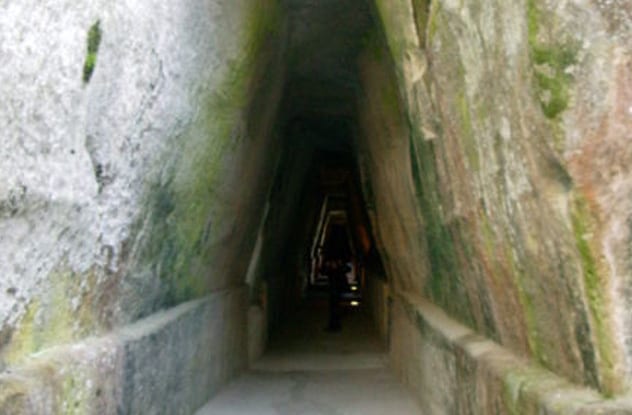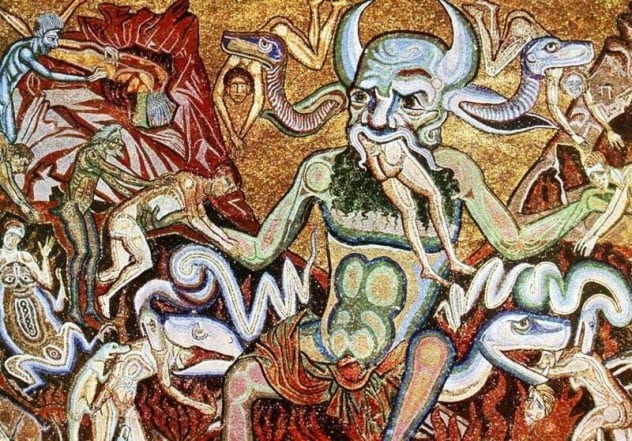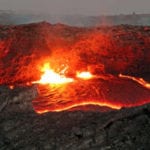 Movies and TV
Movies and TV  Movies and TV
Movies and TV  History
History 10 Wars That Sound Made Up (but Absolutely Happened)
 Movies and TV
Movies and TV 10 Movie Adaptations That Ruined Everything for Some Fans
 History
History 10 Dirty Government Secrets Revealed by Declassified Files
 Weird Stuff
Weird Stuff 10 Wacky Conspiracy Theories You Will Need to Sit Down For
 Movies and TV
Movies and TV 10 Weird Ways That TV Shows Were Censored
 Our World
Our World 10 Places with Geological Features That Shouldn’t Exist
 Crime
Crime 10 Dark Details of the “Bodies in the Barrels” Murders
 Animals
Animals The Animal Kingdom’s 10 Greatest Dance Moves
 Movies and TV
Movies and TV 10 Box Office Bombs That We Should Have Predicted in 2025
 Movies and TV
Movies and TV 10 Movie Franchises That Started Dark but Turned Surprisingly Soft
 History
History 10 Wars That Sound Made Up (but Absolutely Happened)
 Movies and TV
Movies and TV 10 Movie Adaptations That Ruined Everything for Some Fans
Who's Behind Listverse?

Jamie Frater
Head Editor
Jamie founded Listverse due to an insatiable desire to share fascinating, obscure, and bizarre facts. He has been a guest speaker on numerous national radio and television stations and is a five time published author.
More About Us History
History 10 Dirty Government Secrets Revealed by Declassified Files
 Weird Stuff
Weird Stuff 10 Wacky Conspiracy Theories You Will Need to Sit Down For
 Movies and TV
Movies and TV 10 Weird Ways That TV Shows Were Censored
 Our World
Our World 10 Places with Geological Features That Shouldn’t Exist
 Crime
Crime 10 Dark Details of the “Bodies in the Barrels” Murders
 Animals
Animals The Animal Kingdom’s 10 Greatest Dance Moves
 Movies and TV
Movies and TV 10 Box Office Bombs That We Should Have Predicted in 2025
10 Entrances To Hell That You Can Visit
In the ancient world, death was a much more tangible presence in people’s lives. Lives were shorter, and there were no hospitals to hide the dying. The closeness of death made it natural for people to imagine that the afterlife was equally close.
10Alepotrypa

Alepotrypa (“Foxhole”) in Greece is huge cave system that may be the inspiration for the gloomy myth of Hades. The cave even contains a lake that may have been how the dead crossed between worlds.
The cave was lost for millennia until rediscovered by a hunter out with his dog chasing foxes. The fox escaped, but the dog stumbled on an important archaeological site.
Beginning around 6,000 years ago, burials and rituals began in the cave. Pottery and other offerings have been discovered among the 170 individuals buried there. One couple was found embracing for their journey to the next world.
9Actun Tunichil Muknal

Actun Tunichil Muknal is a cave in Belize once thought to be the entrance to the Mayan Underworld, Xibalba. Mayan rituals at the cave involved fire, pottery offerings, and human sacrifice. Victims were led into the cave, hit on the head hard enough to crack the skull, and abandoned where they fell. The pottery would then be smashed and the dead left to cross over.
Beyond the mythic power of the cave, there is a real transformation that occurs. To reach the cave, one must wade through neck-deep waters and tight gaps. The water impregnates the cave and deposits minerals throughout. This has left the sacrifice victims’ skeletons bound to the cave floor with sparkling crystals. One particular skeleton has become known as the Crystal Maiden.
8Plutonium

As well as the radioactive element, Plutonium is also the name of an entrance to the Greek Hades—Pluto’s Gate. In Hierapolis, modern-day Pamukkale in Turkey, there is a place that locals promisingly call a “demon’s hole.” It was here that remains of a shrine to Pluto have been found.
Ancient writers had described the Plutonium, or Plutonion, at Hierapolis, but it was only recently found beside the ruins of a temple to Apollo. During excavation, the Plutonium’s shadowy appeal became obvious. It sits over a natural opening that releases carbon dioxide. While digging at the site, birds that strayed too close suffocated and died.
7Masaya Volcano

When Conquistadors reached Nicaragua, they found an erupting Masaya volcano. Immediately, they labeled it La Boca del Infierno—The Mouth of Hell. The local population had no belief that the volcano was an entrance to the underworld, but the Spanish were sufficiently sure that they planted a cross on the rim of the crater to exorcise the devil. St. Gregory had said that volcanoes were all mouths of hell.
Locals did sacrifice children and women in the lava as a way of trying to end droughts, believing that the mountain was a god to be appeased. It is possible that this local deity was taken for a diabolical trick of Satan by the Christian Spanish.
One friar wrote “that the fire of the volcano of Nicaragua (Masaya) without fuel must be the mouth of Hell, and its fire must be supernatural and hellish, and the place from which the condemned are thrown by the demons.” The huge amounts of sulfur dioxide the volcano releases would certainly have made it unpleasant enough to confuse with hell.
6Lake Pergusa

Sicily is home to Mount Etna, another fiery volcano with a reputation as an entrance to hell. But it is also the site where Hades dragged Persephone, daughter of the harvest goddess, down to his home in the Underworld. The poet Ovid wrote of how Persephone was playing by the nearby Lake Pergusa when Hades seized her. With her daughter missing, Ceres would not allow anything to grow. A compromise was made in which Persephone would spend six months above ground, spring and summer, and six beneath it with her new husband, autumn and winter.
Each year at spring, Persephone rises from hell and emerges through Lake Perusa. In nearby Etna, there was once a temple to Ceres where the goddess would await the return of her daughter.
5Door To Hell

In Turkmenistan, there is a constantly burning crater. Its origins are disputed, but it is decidedly modern. One claim dates it to a Soviet exploration in 1971. While searching for natural gas, they discovered their bore hole was releasing noxious gases. They thought a sensible solution would be to burn them off. The crater caught fire—and has continued to burn ever since.
The Darvaza Crater, as the Door to Hell is more prosaically known, may not have much in the way of antiquity, but it is certainly a draw for tourists in an otherwise empty location. It also, apparently, attracts spiders to its heat and warmth, leading them to tumble into the fiery pit.
4Hells Of Beppu

Unlike some of the other entrances to hell on this list, the Hells of Beppu can be easily reached by bus and are a designated Place of Scenic Beauty. Japan is located on the Pacific Ring of Fire, and so volcanic phenomena abound. Hot springs, such as those found at Beppu, are common. Steaming pools of boiling water erupt at Beppu with fantastically colored muds. To early visitors, they resembled jigoku, Buddhist hells.
The Hells of Beppu range from the beautiful Sea Hell with brilliant blue waters to Chinoike-Jigoku (Blood pond hell) with its red waters and crimson steam. Despite the scenic nature of these hells, there is a darker side. In the past, the scalding waters have been used for torture and execution.
3Fengdu City Of Ghosts

On Ming Mountain in China, a complex of temples and shrines has grown. All have some association with the afterlife and those seeking to reach it. The mountain gained its link to hell when two seekers after wisdom, Yin and Wang, went there to follow Toaist teachings. They became wise immortals, but it is the joining of their name which led to the City of Ghosts being built—Yinwang means “king of hell.”
Visitors looking to avoid hell must pass three tests. Nothing-To-Be-Done-Bridge connects this world to the next. Only the virtuous may cross. The wicked will fall. The next test takes place at Ghost Torturing Pass, where the dead are judged. The third test involves standing on one leg for three minutes on a stone. The evil will topple into hell. Turns out a good sense of balance is vital to the well-being of the soul.
2Cave Of The Sibyl

In the ancient world, people took prophecies seriously. Under the influence of a god, it was thought that certain people could see the future. Dotted throughout the world there were sibyls, female prophets, that people would seek out to answer their questions. The most famous made her home in Italy at Cumae.
In The Aeneid, the Sibyl of Cumae is sought out by Aeneas in her cave. She tells him that to succeed in founding a great nation (Rome), he must descend to the Underworld. He is taken deep into the Earth and sees the spirits of the Illustrious Dead.
In The Aeneid, the sibyl speaks from a cave with 100 mouths that amplifies her prophecies. A cave called the Sibyl’s at Cumae was found in 1932 and does have many entrances, if not quite the poetically amplified 100.
1Necromanteion Of Ephyra

Hades contains five rivers. Interestingly the Necromanteion of Ephyra sits beside three of them: Acheron (“River of woe”), Pyriphlegethon (“Flaming with fire”), and Cocytus (“River of wailing”). It was the Acheron that the ferryman Charon conducted the souls of the dead across. At the Necromanteion of Ephyra, one could seek to communicate with those across the river.
Those seeking to use the Necromanteion would cleanse themselves before being led down into subterranean tunnels passing several iron gates. In the dark, lanterns were lit, and the faithful would see the forms of the dead in the flickering lights.
Excavations at the site have discovered wheels, ratchets, and a mechanism for moving a human image. Perhaps even with their location so close to the rivers of hell, it was still necessary for the priests of the Necromanteion to conjure with more than spirits.
+Further Reading

If you haven’t satiated your appetite for hellish lists, look no further than our archives for more!
10 Visions Of Hell That Will Scare The Crap Out Of You
10 Fascinating Descriptions Of Hell
10 Things Everyone Gets Wrong About Satan
10 Real Places Straight Out Of A Nightmare








